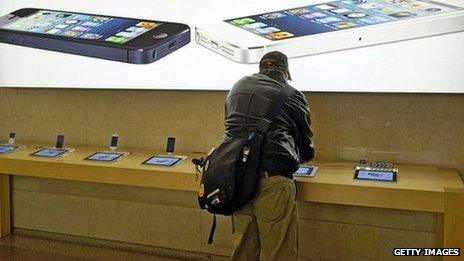Apple's Irish tax deal may be state aid, says Europe
- Published

The European Commission (EC) has told Ireland it believes it gave illegal state aid to Apple.
It has published a letter, originally sent to the country in June, accusing it of helping the computer giant through special tax arrangements.
The EC is looking at whether some countries, including Luxembourg and the Netherlands, unfairly favour multinationals.
Apple says it has received "no selective treatment".
The company employs more than 4,000 people in the Republic of Ireland, mainly assembling computers and providing technical support.
Ireland's corporate tax rate is set at 12.5%, but Apple enjoys an effective rate of tax of 2%, due to the way it channels overseas sales through its subsidiaries.
Repayment
In a statement, the company said: "Our success in Europe and around the world is the result of hard work and innovation by our employees, not any special arrangements with the government.
"Apple has received no selective treatment from Irish officials over the years. We're subject to the same tax laws as the countless other companies who do business in Ireland."
It goes on to say, though, that it believes "comprehensive corporate tax reform is badly needed".
As well as Apple, Fiat and Starbucks are also in the EC's sights.
The Commission told Fiat on Tuesday its preliminary view was that its tax arrangement with a subsidiary of Fiat also constituted state aid. Fiat has not yet commented.
The Commission said it appeared it had the effect of reducing the charges Fiat would normally pay "and that it must consequently be considered as operating aid".
If either company is found to have benefitted from illegal state aid, it will have to repay any tax benefit it received.
There is a wide range of estimates as to the sum that Apple would have to repay - anything between a few tens of millions to billions of euros.
'No breach'
In the letter, the European Commissioner Joaquin Almunia told Ireland: "The Commission's preliminary view is that the tax ruling of 1990 (effectively agreed in 1991) and of 2007 in favour of the Apple group constitute state aid."
Ireland's Department of Finance said in a statement earlier this week: "Ireland is confident that there is no breach of state aid rules in this case and has already issued a formal response to the Commission earlier this month, addressing in detail the concerns and some misunderstandings contained in the opening decision,"
Ireland's flexible approach to tax is designed to attract investment and jobs to the country. But other European countries say their treasuries lose out, as corporations funnel profits through Irish registered companies that are not resident for tax anywhere.
The EU's move comes as the Organisation for Economic Co-operation and Development begins a broader crackdown on aggressive tax avoidance by multinational companies.
- Published30 September 2014
- Published11 June 2014
- Published21 May 2013
- Published16 April 2014